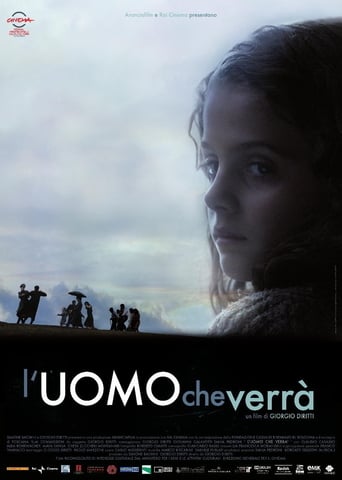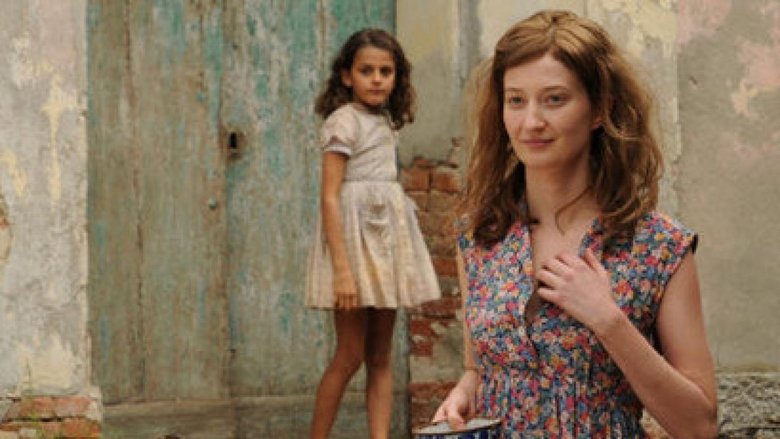

The Man Who Will Come (2009)
A group of Italian villagers struggle to survive during a tumultuous time in 1943, debating how much assistance to give the partisans with the impending arrival of the Germans. Based on True Events.
Watch Trailer
Cast


Reviews
Yawn. Poorly Filmed Snooze Fest.
Memorable, crazy movie
Good movie but grossly overrated
This is one of the best movies I’ve seen in a very long time. You have to go and see this on the big screen.
This movie is mostly seen through the eyes of the young girl, Martina, who along with the other children provides a depth of innocence which is the counterpoint to the ice-cold brutality of an invading army. The various viewpoints and behaviour of the diverse groups: villagers - old and young; partisans living in the woods;the clergy; the invading forces with their various levels of humanity from ruthless soldiers whose souls are dead to those who can't help but feel compassion for the people they are invading, never seem clichéd even though they may be in so many war movies. This is simply humanity at war, portrayed clearly and credibly without the slightest pretence. The cinematography, direction and acting are supremely natural, creating a fine, memorable movie.
Despite being beautifully shot and well-made (and a few well-done scenes such as the skirmish and execution of a captured German soldier) this one's pretty much a dud...deals with historical events with which most non-Italians are probably not familiar (German atrocities against Italian civilians during the latter half of WWII) but other than cinematically treating a new chapter in that era's history the film doesn't have much to offer, mainly because it uncritically relies on the default narrative/theme for movies on the general subject of WWII in Europe (Germans/Nazis=bad/evil (irrational obsessive homicidal nationalist maniacs), everyone else=good).I guess the size and/or "taste" of the "American" market has to be mentioned as the primary reason many non-American directors find it difficult to make films with moral complexity beyond the imagination of a three-year old? (To give one potential example, (Italian) communist partisans would sometimes ambush German units while the latter were in regions known to be pro-fascist/Mussolini, in the hopes that the Germans were enact reprisals against the local civilians, whom the communists hated as much or more than the Nazis (people often hate those closer to them than those far away)--but would an Italian director dare make such a film? Apparently not.)Edit: To be fair there were a couple of minor details in this direction, such as the SS man who was unable to fire the heavy machine gun and the officer who helped the woman who survived the mass shooting (although that was kind of bizarre itself). But larger themes, such as why was the German presence so bad that the villagers were willing to risk their families to try to get rid of it (all the Germans seemed to do was ask for wine and then pay for it) were lacking. Also the depiction of the Italian civilians was radically naive--were they all really just simple happy country folk who cared only for food, family and Catholicism? Such stereotypes are themselves infantilizing.
I saw "L'uomo che verrà" in a small theater in Florence, Italy last February.One of the beautiful things about the film is that it will appeal to various audiences in very different, albeit powerful ways. It was related to me that the historical events portrayed and implied by the film are quite accurate, so locals from the mountains above Bologna or history buffs won't feel disappointed by an inaccurate rendition. Depending on their demographic other Italians should either be able to sympathize or empathize with characters in the movie as well. For viewers that are not European, I can confidently say that they will find themselves presented with an old theme (Nazi occupation and brutality) delivered in a novel and unique theatrical vessel.Additionally, the cinematography is wonderful. I truly did feel as if I was in the countryside with the characters of the movie being terrorized by a foreign occupying force.As a side note, the movie is in a dialect that most Italians will not even understand. With the good subtitles, I felt that it actually added to the movie's appeal.
Between September 29 and October 5 1944 on Monte Sole, an area of the Appenine Mountains near Bologna, S.S. Officer Weder reported "the execution of 728 bandits." These "bandits" were in fact around 770 civilian inhabitants of the area - women, priests, the elderly, and over two hundred children - who were systematically killed by the local SS troops in a sweeping reprisal for partisan activity in the area. "L'Uomo Che Verrà" ("The Man Who Will Come") re-enacts the event through the eyes of a young girl who observes the world in silence.Working oneself up to seeing such a film is nearly always a task - we know how it will end, and we know it will be devastating. But as the beginning of the film focuses on the everyday lives of Martina (a little girl gone mute ever since her baby brother died in her arms) and her family, one almost forgets the film's grim destination. Almost.The film is fanatically, sometimes brutally, devoted to portraying real life. There are no heroes (except for perhaps Martina herself), and very few clear villains (except for perhaps one or two of the SS who mark themselves out); there is no love story, and, eventually, no easy release from the horror. The partisans are neither heroic saviors nor selfish bandits; merely men who are waging battle against the invaders, sometimes committing ugly acts as a matter of course. The colors in the cinematography sometimes resemble old photographs, the clothes are dirty, torn, and in the case of the little girl, almost outgrown, and, realistically, nearly all the dialog is spoken in Bolognese dialect, which is so foreign from standard Italian that nearly the entire movie is subtitled in Italian for the benefit of audiences on the rest of the peninsula.It is also beautiful. The cinematography shows the Appenines in all their green, stark glory, and the moments of happiness and peace and laughter that the family find even in wartime, though they contribute to the realism rather than soften it, render the film bearable and lend it beauty.While we in the Western hemisphere are aware of the horrors of Holocaust, Normandy, and war the Pacific, the ugly and frequently horrifying Italian front has long gone ignored or forgotten. Once this film is released with English subtitles, with any luck, this omission might be remedied.




